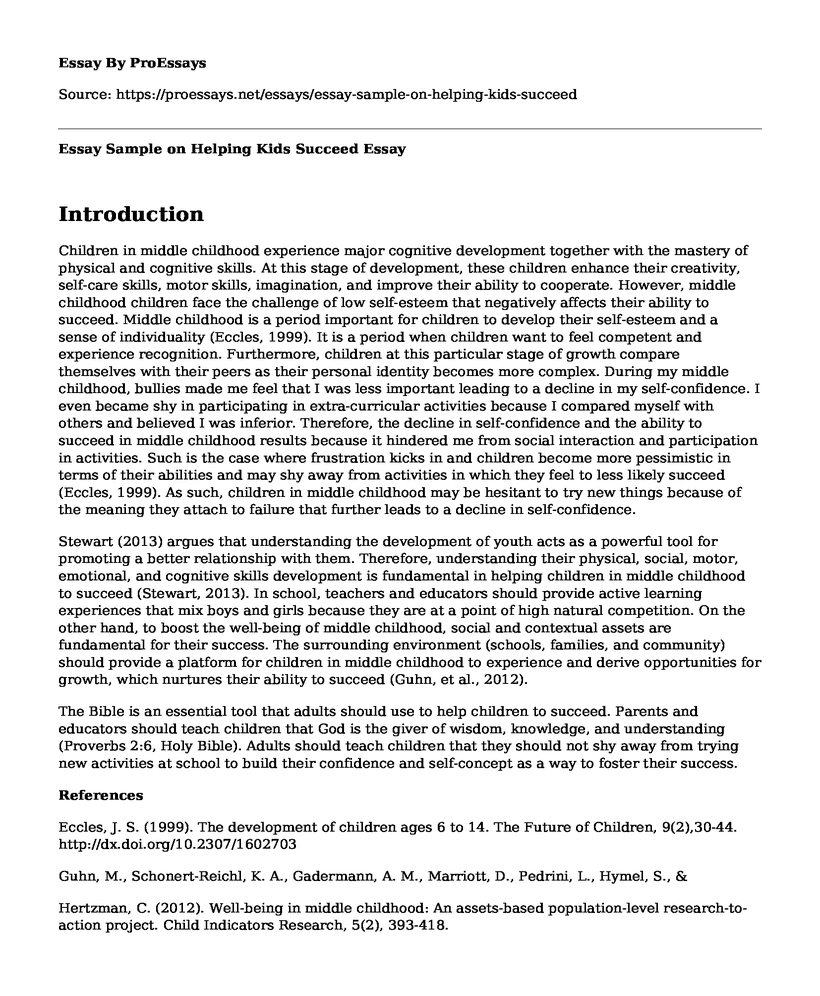Introduction
Children in middle childhood experience major cognitive development together with the mastery of physical and cognitive skills. At this stage of development, these children enhance their creativity, self-care skills, motor skills, imagination, and improve their ability to cooperate. However, middle childhood children face the challenge of low self-esteem that negatively affects their ability to succeed. Middle childhood is a period important for children to develop their self-esteem and a sense of individuality (Eccles, 1999). It is a period when children want to feel competent and experience recognition. Furthermore, children at this particular stage of growth compare themselves with their peers as their personal identity becomes more complex. During my middle childhood, bullies made me feel that I was less important leading to a decline in my self-confidence. I even became shy in participating in extra-curricular activities because I compared myself with others and believed I was inferior. Therefore, the decline in self-confidence and the ability to succeed in middle childhood results because it hindered me from social interaction and participation in activities. Such is the case where frustration kicks in and children become more pessimistic in terms of their abilities and may shy away from activities in which they feel to less likely succeed (Eccles, 1999). As such, children in middle childhood may be hesitant to try new things because of the meaning they attach to failure that further leads to a decline in self-confidence.
Stewart (2013) argues that understanding the development of youth acts as a powerful tool for promoting a better relationship with them. Therefore, understanding their physical, social, motor, emotional, and cognitive skills development is fundamental in helping children in middle childhood to succeed (Stewart, 2013). In school, teachers and educators should provide active learning experiences that mix boys and girls because they are at a point of high natural competition. On the other hand, to boost the well-being of middle childhood, social and contextual assets are fundamental for their success. The surrounding environment (schools, families, and community) should provide a platform for children in middle childhood to experience and derive opportunities for growth, which nurtures their ability to succeed (Guhn, et al., 2012).
The Bible is an essential tool that adults should use to help children to succeed. Parents and educators should teach children that God is the giver of wisdom, knowledge, and understanding (Proverbs 2:6, Holy Bible). Adults should teach children that they should not shy away from trying new activities at school to build their confidence and self-concept as a way to foster their success.
References
Eccles, J. S. (1999). The development of children ages 6 to 14. The Future of Children, 9(2),30-44. http://dx.doi.org/10.2307/1602703
Guhn, M., Schonert-Reichl, K. A., Gadermann, A. M., Marriott, D., Pedrini, L., Hymel, S., &
Hertzman, C. (2012). Well-being in middle childhood: An assets-based population-level research-to-action project. Child Indicators Research, 5(2), 393-418. http://dx.doi.org/10.1007/s12187-012-9136-8
Stewart, J. (2013). 9- to 11-year-olds: Ages and stages of youth development. Retrieved from http://msue.anr.msu.edu/news/9_to_11_year_olds_ages_and_stages_of_youth_development
Cite this page
Essay Sample on Helping Kids Succeed. (2022, Nov 25). Retrieved from https://proessays.net/essays/essay-sample-on-helping-kids-succeed
If you are the original author of this essay and no longer wish to have it published on the ProEssays website, please click below to request its removal:
- Be Aware About Anti-Bias for Preschool
- Interpreting Poetic Messages From the Bible Paper Example
- Life Without a Father - Narrative Essay
- Pharmacotherapeutic Agents in the Treatment of Mental Health Disorders Essay
- Essay Sample on Maturity and Self-Identity in Short Story Boys and Girls by Alice Munro
- Movement to Reduce Mental Health Stigma - Essay Sample
- Journey to the West: Epic Adventure in Search of Buddha's Sacred Scriptures - Essay Sample







